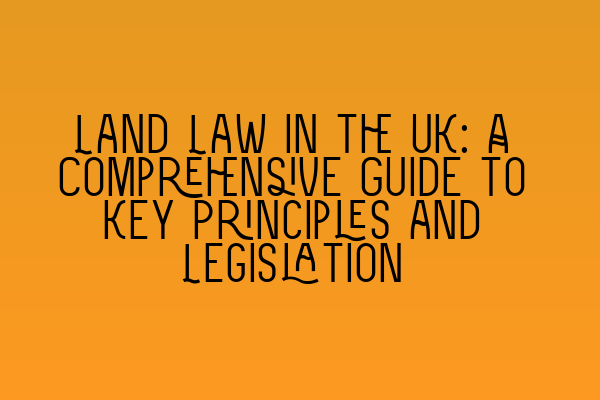Land Law in the UK: A Comprehensive Guide to Key Principles and Legislation
Welcome to our comprehensive guide to land law in the UK. Whether you are a property owner, a real estate professional, or simply someone interested in understanding the intricacies of land ownership and regulation, this guide is designed to provide you with a clear and thorough overview of the key principles and legislation that govern land in the UK.
1. Introduction
Land law is a branch of law that deals with the rights, obligations, and interests associated with land and the structures built upon it. It encompasses a wide range of legal concepts, including ownership, possessory rights, leasehold and freehold rights, easements, covenants, and more.
To navigate the complexities of land law effectively, it is essential to have a solid understanding of the key principles and legislation that underpin the system. In this guide, we will break down the key concepts and legal frameworks to help you develop a comprehensive understanding of land law in the UK.
2. Key Principles of Land Law
2.1 Ownership: At its core, land law determines who owns a piece of land and the structures on it. In the UK, land can be either freehold or leasehold. Freehold refers to absolute ownership of the land and any buildings on it, while leasehold refers to a temporary right to use the land and buildings for a specified period.
2.2 Possessory Rights: Possessory rights refer to the legal recognition and protection of an individual’s right to possess and occupy a specific piece of land. These rights can arise through ownership, a leasehold agreement, or other legal arrangements.
2.3 Easements: Easements are rights that allow one party to use or access another party’s land for a specific purpose. Examples of easements include rights of way, rights to light, and rights to drain water through a neighboring property.
2.4 Covenants: Covenants are agreements that impose certain obligations or restrictions on the use of land. These obligations and restrictions may be created through deeds or contracts and can have a significant impact on a property’s value and use.
3. Relevant Legislation
3.1 Land Registration Act 2002: This legislation established a national system of land registration in England and Wales. It sets out the requirements for registering land, the creation and protection of certain rights, and the priority of competing interests.
3.2 Law of Property Act 1925: This act is one of the most significant pieces of legislation in UK land law. It consolidated and simplified previous laws relating to property and created the concept of registered land.
3.3 Landlord and Tenant Act 1954: This act governs the relationship between landlords and tenants and provides security of tenure for commercial leases. It sets out procedures for lease renewals, rent reviews, and termination of tenancies.
3.4 Town and Country Planning Act 1990: This act regulates the use and development of land in England and Wales. It sets out the planning permission process, controls over building works, and measures to protect the environment and public interest.
4. Importance of Professional Legal Advice
Understanding land law can be a complex and challenging endeavor. The intricacies of land ownership and regulation require expert knowledge and experience to navigate effectively. Engaging the services of a qualified solicitor who specializes in property law is vital to ensuring compliance with legal requirements and protecting your interests.
If you require professional legal advice or assistance with any land law matters, our team of experienced solicitors at SQE Property Law & Land Law is here to help. Contact us today to schedule a consultation.
For more information on related topics, please visit these articles:
- SQE 1 Practice Exam Questions
- SQE 1 Practice Mocks FLK1 FLK2
- SQE 2 Preparation Courses
- SQE 1 Preparation Courses
- SRA SQE Exam Dates
We hope you found this comprehensive guide to land law in the UK informative and useful. If you have any further questions or require specific advice, please do not hesitate to reach out to us. Our expert team is ready to assist you.
